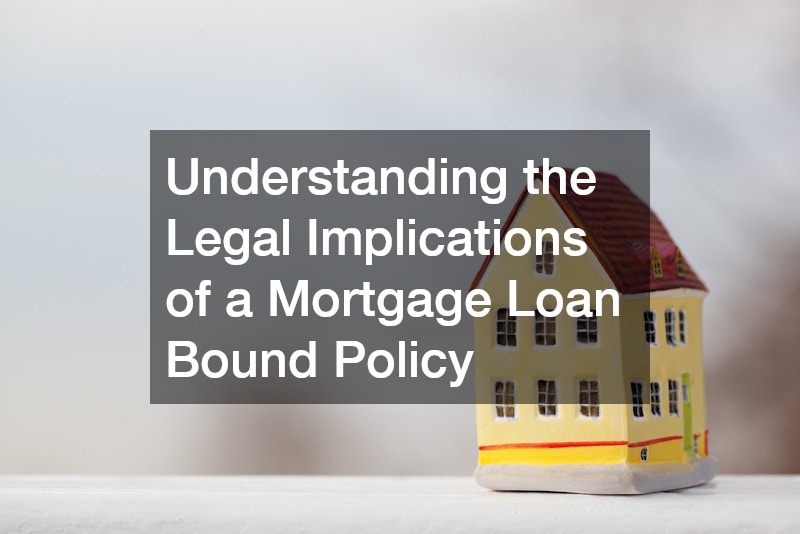The world of mortgage loan bound policy is intricate and requires diligence to navigate successfully. For potential homeowners, understanding this complex landscape is crucial to securing their property investment. As the interplay of mortgage loans, insurance agencies, and legal considerations grows increasingly complex, homeowners must be informed.
Protecting one’s financial interests during the acquisition of a home involves more than just securing a reasonable interest rate. Homeowners must consider the implications of home additions, renovations, and even the broader financial planning strategies that come into play. This comprehensive guide will explore these facets, offering insights into the role of an estate planner, reliable attorneys, and foreclosure lawyers.
Through a detailed examination of key topics such as mortgage licensing, insurance coverage, and compliance, this article aims to empower homeowners. Understanding the legal protection available, especially in situations like foreclosure, is a necessity. Navigating these waters can be complex, but with the right knowledge and professional guidance, homeowners can make informed decisions.
Navigating the Role of Insurance in Mortgage Transactions

A mortgage loan bound policy plays a crucial role in safeguarding your property investment. It acts as a protective shield not only for the lender but also for the borrower, ensuring that unforeseen events are covered. Insurance agencies often outline specific requirements that must be met to secure this policy, adding a layer of complexity to the mortgage process.
For homeowners, understanding the differences between various types of insurance, such as mortgage insurance and homeowners insurance, is vital. Each type serves distinct purposes, and knowing how they interact will help in formulating a well-rounded approach to safeguarding your property. By consulting with an insurance agency, borrowers can better understand what coverage they need and avoid potential pitfalls.
The involvement of home builders can impact insurance coverage requirements, particularly during new constructions or major renovations. Home additions need to be assessed accurately for any potential impact on the existing insurance plan, which is why regular communication with an insurance agent is vital. Furthermore, mortgage loan bound policy terms can change based on home improvements, making annual reviews essential.
Key Legal Considerations for Protecting Your Property Investment
Navigating the legal landscape of property investment requires a keen understanding of various legal protections in place. Engaging a reliable attorney can provide you with an added advantage by ensuring compliance with all applicable laws and regulations. Mortgage licensing is governed by strict legal requirements, failure to adhere to which can result in significant financial setbacks.
It is important to understand the deeds and titles associated with your property, as these are pivotal in establishing ownership and legal rights. Mortgage loan agreements should be scrutinized carefully to understand the roles and responsibilities of all parties involved. Consulting with an estate planner can offer insights into long-term property succession planning, further securing your investment.
Legal documentation is not only a matter of compliance but can also be an effective tool for risk mitigation. For instances of potential foreclosures, having access to knowledgeable foreclosure lawyers can strategically position you for a favorable outcome. Each legal text related to the property must be evaluated for potential clauses that could have lasting implications on the ownership and use of your home.
The Importance of Compliance in Mortgage Financing
Adhering to compliance regulations in mortgage financing is essential for maintaining the legitimacy and integrity of the transaction. Mortgage loan bound policy requirements often encompass a range of compliance measures that need to be met before approval can be granted. Failing to comply with these requirements can result in penalties, delays, or even the outright rejection of the loan application.
Compliance is not merely a formality but ensures the legality and defensibility of your mortgage loan agreement. Financial planners and mortgage specialists can aid in identifying and addressing areas of concern in the compliance process. By enlisting professional help, borrowers can focus on maintaining the ethical standards required by both state and federal regulations.
Navigating compliance also involves understanding the mortgage licensing requirements specific to the state where the property is located. Insurance agencies play a critical role in compliance, as they often necessitate speculative coverage policies that hinge on state regulations. Compliance consulting ensures that every step taken in the mortgage process is validated legally.
How Home Improvements Can Affect Your Insurance Coverage

Home improvements and renovations often bring positive changes, however, they can also drastically impact your insurance coverage. Each addition or structural change alters the value and risk profile of your property, thereby affecting the mortgage loan bound policy associated with it. It is essential to report these changes to your insurance agency promptly to reassess your coverage needs. As your property evolves, so too will the insurance premiums, which should be discussed with an insurance agency. Proper documentation ensures that all aspects of home remodeling are considered in updated coverage plans.
From kitchen remodeling to the addition of new rooms, these improvements can increase your home’s value and could necessitate adjustments in your insurance. Consulting with insurance professionals ensures that your policy reflects current property values and mitigates any uncovered risks. Failing to update your policy post-renovation could leave you vulnerable in the event of a claim.
Home builders must collaborate closely with insurance agencies during major developments, ensuring every improvement aligns with coverage requirements. Financial planning should incorporate potential changes in insurance premiums, keeping the homeowner prepared for possible financial adjustments. Ignoring the impact of home improvements on insurance can lead to significant coverage gaps during a crisis.
Integrating Estate Planning into Your Home Financing Strategy
An estate planner can provide invaluable insight when integrating estate planning into your home financing strategy. The mortgage loan bound policy you choose today may have significant repercussions on your estate planning goals in the future. Therefore, aligning these objectives can offer a harmonious approach to both living arrangements and long-term asset succession.
Estate planning can help safeguard your property investment from unforeseen events, such as ill health or sudden passing. It ensures that the property’s transition is seamless without cumbersome legal wrangling, reducing the burden on loved ones. Working with a reliable attorney specializing in estate law can solidify plans, aligning them with the mortgage and insurance landscape.
By encompassing living wills, trusts, and probate considerations, estate planning rounds off a comprehensive financial strategy. Homeowners must periodically revisit their estate plans and make necessary amendments to reflect changes in home value or mortgage agreements. Thoughtful planning can thus offer peace of mind and secure the future of your home investment.
The Benefits of Consulting with Professionals During Mortgage Processes

Seeking the guidance of professionals, such as mortgage brokers, financial planners, and attorneys, provides a more structured approach to home buying. Their expertise can offer insights into achieving the best mortgage loan bound policy tailored to your needs. They also facilitate the navigation of complex loan structures, ensuring that each decision is legally sound and financially viable.
Experienced professionals bring invaluable knowledge to the table, enabling homeowners to leverage market conditions. This expertise extends to interpreting obscure clauses within mortgage loan agreements and understanding their implications on long-term financial health. Reliable advice can significantly enhance your financial preparedness, allowing for informed decision-making.
Professionals are also vital in performing due diligence on the legality of actions taken during the mortgage process. This includes ensuring compliance with mortgage licensing laws, assessing potential tax implications, and aligning insurance policies with state regulations. By working with competent experts, homeowners safeguard their investments through informed strategies and comprehensive planning.
Exploring the Relationship Between Construction and Mortgage Insurance
The relationship between construction activities and mortgage loan bound policies is complex yet integral to securing property investments. Construction projects, especially those handled by home builders, significantly influence mortgage insurance needs. These activities often dictate additional insurance requirements that must be considered during the financing process.
Depending on the scale of construction, mortgage loan policies may incorporate different insurance clauses that need professional assessment. It is essential to understand how these modifications affect your current insurance coverage and future premiums. Working closely with insurance agents ensures that every aspect of construction is appropriately covered.
Home renovations directly impact the valuation of your property, thereby affecting the specified insurance coverage in your mortgage loan policy. As value shifts, so too does the need for updated insurance policies, making it imperative for reassessment in collaboration with insurance agencies. This relationship underscores the importance of integrating comprehensive coverage strategies throughout the construction process.
Financial Planning for Homeowners: Ensuring Adequate Coverage
Proper financial planning is key to ensuring your mortgage loan bound policy covers all potential risks. Consulting with financial planners allows homeowners to tailor their insurance schemes to fit individual needs efficiently. Such guidance ensures that coverage is optimally aligned with the property’s current and future valuations.
Financial planners assist in evaluating the adequacy of existing policies and suggest adjustments as necessary. They take into account economic factors, market conditions, and personal financial goals, recommending actions to protect against unforeseen circumstances. Adhering to these insights is crucial in maintaining robust protection for your home’s financial future.
Unanticipated events, such as natural disasters or market downturns, demand flexibility in your insurance policy, achieved through proactive financial planning. Periodic reviews of coverage help align insurance requirements with evolving financial landscapes. Ensuring comprehensive coverage is a dynamic process, with proper financial planning serving as the glue that holds it all together.
Recognizing Potential Risks in Your Mortgage and Insurance Agreements
Homeowners must be vigilant in identifying risks embedded within mortgage loan agreements and insurance policies. These may include hidden clauses, unexpected rate hikes, or inadequate coverage for certain perils. Regular scrutiny of these agreements helps pinpoint vulnerabilities before they can be exploited.
Collaborating with an insurance agency expels ambiguity in policy terms, allowing for a clear understanding and management of risk exposure. They provide clarity on the interplay between mortgage loans and corresponding insurance policies. Clear and transparent communication with all involved parties mitigates potential conflicts down the road.
Foreclosure lawyers and reliable attorneys play pivotal roles in assessing risks tied to foreclosure processes. They inform homeowners of their legal rights and effective measures to take in the face of mortgage defaults. Homeowners should consistently reassess their positions to identify and reduce exposure to potential financial risks.
Legal Protections Available in the Event of Foreclosure
The threat of foreclosure is a daunting prospect for any homeowner, but understanding the legal protections available can provide some respite. Reliable attorneys specializing in foreclosure law can offer guidance on legal recourse options and defense strategies. Knowing your rights is imperative in navigating any proceedings that may arise from such situations.
State laws vary in terms of foreclosure processes and the rights they afford homeowners, making it advantageous to enlist localized legal expertise. Foreclosure lawyers serve as crucial advisors, ensuring documentation and tactics align with state-specific legislation. Their involvement optimizes legal positioning to protect against unwarranted foreclosure actions.
Certain foreclosure prevention programs, backed by government legislation, offer additional avenues for safeguarding homeownership. Homeowners are encouraged to seek out these programs proactively, understanding the aid available through public resources. By constructing a robust legal defense strategy, homeowners can better weather the trials of potential property loss.
Assessing the Impact of Market Changes on Your Insurance Policy

Fluid market conditions can have vast implications on insurance policies tied to mortgage loan bound plans. Changes in property value, interest rates, and inflation all contribute to the need for policy reassessment. When the market shifts unexpectedly, revisiting existing policies helps ensure continued compliance and protection.
Homeowners must work diligently with their insurance agencies to tweak policies in response to market developments. This ongoing assessment ensures risk exposure remains adequately covered as property valuations fluctuate. Consulting with experts provides the foundation for adapting efficiently to such financial variances.
National economic trends, such as recessions or housing booms, should also prompt homeowners to reassess their financial coverage strategy. The assistance of reliable agents and planners aids in molding adaptive insurance plans befitting evolving market conditions. In this way, the integrity of comprehensive coverage endures irrespective of broader economic environments.
Strategies for Ensuring Compliance with Mortgage Regulations
Ensuring compliance with mortgage regulations is crucial to maintaining the legality and security of any real estate investment. A solid strategy involves understanding state and federal laws governing mortgage loan bound policy agreements and insurance mandates. Consulting professionals with a grasp of these compliance essentials can offer additional peace of mind.
Regular audits of mortgage documentation and financial statements identify areas where compliance may have lapsed. Mortgage licensing authorities provide additional resources and guidelines on maintaining legal obligations throughout the term of the loan. Proactive engagement with these resources enhances compliance measures significantly.
Establishing open lines of communication with all stakeholders, including lenders, insurance agencies, and legal advisors, primes property owners for compliance success. By staying well-informed and seeking clarification on unclear regulatory parameters, potential compliance breaches can be preemptively addressed. With capable guidance, homeowners can confidently uphold their responsibilities within the regulatory framework.
Navigating the intricate layers of mortgage loan bound policy and the associated insurance guidelines requires diligent planning and informed decision-making. Understanding the legal, financial, and compliance implications of these strategies underpin the safeguarding of home investments. Homeowners capable of leveraging diverse professional advice are better positioned to maintain robust legal protection and solid financial security.
Comprehensive awareness of this multi-faceted environment, gained through proactive engagement with experts, offers critical peace of mind. By dynamically updating and aligning plans according to market conditions, long-term property investment goals stay realized. Mortgage and insurance dealings demand clarity to solidify the structural foundations of property ownership.
As challenges and opportunities emerge in the realm of mortgage and insurance strategies, steadfast preparation paves the way for resilience and prosperity. Homeowners are advised to integrate comprehensive planning approaches into their property investment schemes, effectively embracing future complexities. With foresight and concerted effort, the journey to homeownership becomes one of assurance and achievement.

